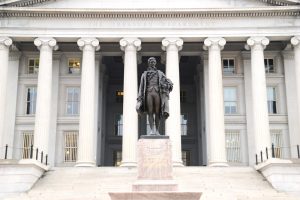The United States government has imposed a further round of sanctions against military-ruled Myanmar, this time targeting the supply of aviation fuel to the country’s air force, amid a rise in deadly air strikes on civilian populations.
In a statement Friday, the U.S. Treasury Department said that it was imposing sanctions against two individuals and six entities that are “connected to Burma’s military and that have enabled the military regime’s continuing atrocities, including through the importation, storage, and distribution of jet fuel to Burma’s military.”
“Burma’s military regime continues to inflict pain and suffering on its own people,” the Treasury’s Under Secretary for Terrorism and Financial Intelligence, Brian Nelson, said in the statement. “The United States remains steadfast in its commitment to the people of Burma, and will continue to deny the military the materiel it uses to commit these atrocities.”
The sanctions were accompanied by the Treasury’s release of a Burma Jet Fuel Sanctions Alert, issued in order “to inform individuals, businesses, and other persons of the sanctions risks associated with the provision of jet fuel to Burma’s military regime.”
Since launching a military coup in February 2021, Myanmar’s military administration has struggled to put down the expanding armed resistance to its rule. As a result, it has leaned increasingly on its absolute advantage in firepower, using airstrikes to target schools, cultural events, and places of worship.
According to the United Nations, the military carried out at least 670 air attacks last year, 12 times more than the 54 recorded in 2021. In a report earlier this month documenting the second year of the junta’s rule, the U.N. found that violence had intensified in northwestern and southeastern Myanmar due to the military’s “indiscriminate air strikes and artillery shelling, mass burnings of villages to displace civilian populations, and denial of humanitarian access.”
As these attacks have escalated, activists have been calling for months for foreign governments to restrict the military’s access to aviation fuel. Given the disbursed and attenuated nature of global supply chains, however, this is easier said than done. In a recent report, the rights group Amnesty International revealed that fuel intended for civilian aviation was being diverted to the military, including shipments from foreign oil majors like ExxonMobil, Thai Oil, PetroChina, and Rosneft.
In foreshadowing the announcement of these sanctions last week, U.S. State Department Counselor Derek Chollet told reporters in Jakarta, “We’re committed to ratchet up the pressure on the junta and make it harder for them to generate revenue, which is fueling its war machine.”
These latest U.S. sanctions target three firms – Asia Sun Group, Asia Sun Trading Co. Ltd., And Cargo Link Petroleum Logistics Co. Ltd. – who have all been involved in the supply of aviation fuel to Myanmar’s air force. They have also been imposed against a range of individuals that are “associated with or have provided equipment to Burma’s military,” including one Tun Min Latt, a close associate of junta leader Senior Gen. Min Aung Hlaing, who has used an array of companies to “import military arms and equipment, including drones and aircraft parts.” Tun Min Latt was arrested last September by Thai police on charges of narcotics trafficking and money laundering.
Like most past rounds of sanctions, this announcement was pinned to a symbolic date, in this case, Armed Forces Day on March 27, which is marked by a lavish military parade in the capital Naypyidaw and self-aggrandizing rhetoric about the legacy and traditions of the Myanmar military. Prior to this, Washington had imposed sanctions on 80 individuals and more than 30 entities inside Myanmar.

































